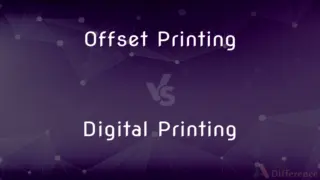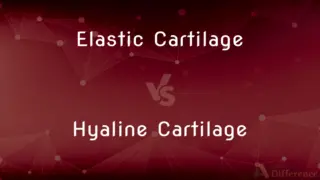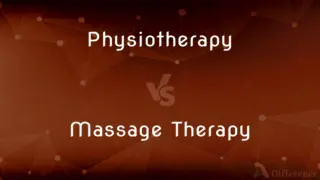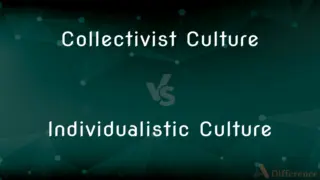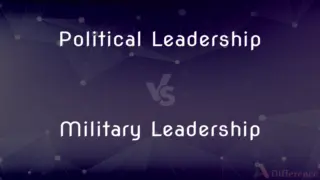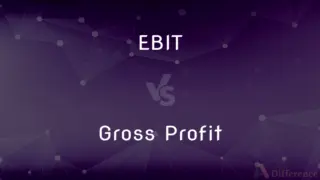Appreciative vs. Grateful — What's the Difference?
By Tayyaba Rehman & Maham Liaqat — Updated on April 5, 2024
Appreciative relates to recognizing and enjoying the good qualities of something, whereas grateful denotes a deep sense of thankfulness, often for a specific act of kindness or benefit received.
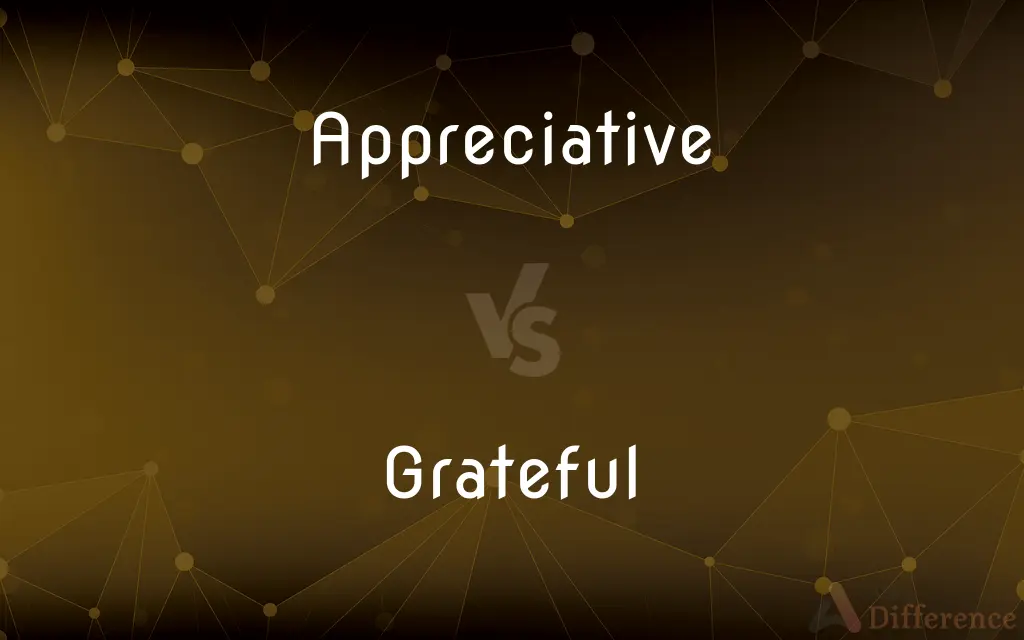
Difference Between Appreciative and Grateful
Table of Contents
ADVERTISEMENT
Key Differences
Being appreciative involves acknowledging and valuing the positive aspects of situations, things, or people's actions. It often reflects an attitude of admiration or approval, focusing on the qualities or efforts of others. On the other hand, feeling grateful goes beyond mere recognition, embodying a heartfelt response to kindness or generosity received, implying a deeper emotional connection and often leading to an expression of thanks.
While someone who is appreciative might express admiration for someone's skills or the beauty of nature, a grateful person would express thankfulness for something specific that has been done for them, such as a friend helping in a time of need. Appreciation can be felt for general qualities or experiences, whereas gratitude is typically directed towards a benefactor or a specific act of kindness.
In terms of expression, appreciation is often conveyed through compliments or positive acknowledgment, highlighting the intrinsic value of something or someone. Gratitude, however, is usually expressed through heartfelt thanks, which can be more personal and reflective of the impact of someone’s actions on one’s life.
Practicing appreciation can lead to a greater enjoyment of life and improved mental well-being by focusing on the positive aspects around us. Gratitude, however, deepens our connections with others and fosters a sense of well-being by acknowledging how others' actions have benefited us, encouraging a cycle of kindness and generosity.
Both appreciation and gratitude are positive states that contribute to one’s happiness and social harmony, but appreciation is broader and more general, while gratitude is deeper and more specific. Cultivating both can lead to a more fulfilled and contented life, recognizing the good in the world and in the actions of others.
ADVERTISEMENT
Comparison Chart
Definition
Acknowledging the good qualities
Feeling thankful for benefits received
Focus
Positive aspects or qualities
Specific acts of kindness or benefits
Emotional Depth
More general and cognitive
Deeper emotional response
Expression
Compliments, positive acknowledgment
Heartfelt thanks, personal acknowledgments
Outcome
Enjoyment, improved well-being
Strengthened relationships, well-being
Compare with Definitions
Appreciative
Enjoying or valuing the positive aspects of life.
They were appreciative of the sunny weather during their vacation.
Grateful
Appreciating the assistance or generosity of others.
They were grateful for the community's outpouring of love.
Appreciative
Recognizing the value or quality of something.
She was appreciative of the beautiful artwork in the gallery.
Grateful
Expressing gratitude for specific acts.
She sent a note expressing how grateful she was for their support.
Appreciative
Expressing recognition for something's worth.
The audience was appreciative of the musician's performance.
Grateful
Having a deep sense of thankfulness.
She felt deeply grateful for the second chance she was given.
Appreciative
Showing admiration or approval.
He was appreciative of his team's efforts to meet the deadline.
Grateful
Valuing the impact of others' actions on one’s life.
He was grateful for his mentor's guidance through the years.
Appreciative
Being aware of and thankful for good things.
She was appreciative of her friend's supportive words.
Grateful
Feeling thankful for a kindness or benefit.
He was grateful for the help he received during his illness.
Appreciative
Capable of or showing appreciation.
Grateful
Feeling or showing an appreciation for something done or received
I'm grateful to you for all your help
She gave him a grateful smile
Appreciative
Showing appreciation or gratitude.
Grateful
Appreciative of benefits received; thankful
I'm grateful for your help.
Appreciative
Capable of showing appreciation.
Grateful
Expressing gratitude
A grateful look.
Appreciative
Having or showing a just or ready appreciation or perception; as, an appreciative audience.
Grateful
Affording pleasure or comfort; agreeable
Grateful relief from the hot sun.
Appreciative
Feeling or expressive of gratitude;
Was appreciative of his efforts
An appreciative word
Grateful
Appreciative; thankful.
I'm grateful that you helped me out.
I'm grateful to you for helping me out.
Appreciative
Having or showing appreciation or a favorable critical judgment or opinion;
Appreciative of a beautiful landscape
An appreciative laugh from the audience
Grateful
(obsolete) Pleasing, welcome.
Grateful
Having a due sense of benefits received; kindly disposed toward one from whom a favor has been received; willing to acknowledge and repay, or give thanks for, benefits; as, a grateful heart.
A grateful mindBy owing, owes not, but still pays.
Grateful
Affording pleasure; pleasing to the senses; gratifying; delicious; as, a grateful present; food grateful to the palate; grateful sleep.
Now golden fruits on loaded branches shine,And grateful clusters swell.
Grateful
Feeling or showing gratitude;
A grateful heart
Grateful for the tree's shade
A thankful smile
Grateful
Affording comfort or pleasure;
The grateful warmth of the fire
Common Curiosities
Can you be appreciative without being grateful?
Yes, one can appreciate qualities or efforts without necessarily feeling a personal sense of indebtedness or thankfulness that gratitude entails.
How can appreciation improve well-being?
Appreciation can improve well-being by focusing on the positive aspects of life, leading to greater enjoyment and satisfaction.
How does being grateful differ from being appreciative?
Being grateful involves a deeper emotional response of thankfulness towards specific acts of kindness or benefits received, whereas appreciative is more about recognizing value or quality.
Why is it important to express gratitude?
Expressing gratitude is important because it acknowledges the positive impact others have on our lives, strengthening relationships and fostering positivity.
Is gratitude more emotional than appreciation?
Yes, gratitude typically involves a deeper emotional connection and thankfulness for specific benefits received, making it more emotional.
Does appreciation have to be expressed to others?
While often expressed to others, appreciation can also be a personal feeling of admiration or enjoyment that doesn’t need to be outwardly expressed.
What are ways to express gratitude?
Gratitude can be expressed through heartfelt thanks, personal notes, and gestures that show how much someone’s kindness has meant.
How can one show appreciation?
Appreciation can be shown through compliments, positive acknowledgment, and expressing admiration for qualities or efforts.
What does it mean to be appreciative?
Being appreciative means recognizing and valuing the positive qualities or efforts of others or situations.
How do cultural differences impact expressions of appreciation and gratitude?
Cultural norms influence how openly and in what ways appreciation and gratitude are expressed, with some cultures emphasizing verbal expressions and others focusing on actions or gifts.
Can practicing gratitude change your perspective on life?
Yes, regularly practicing gratitude can shift one’s focus to the positive, enhancing overall happiness and perspective on life.
What role does appreciation play in the workplace?
In the workplace, appreciation can boost morale, motivation, and productivity by recognizing and valuing employees' contributions and efforts.
How does gratitude affect relationships?
Gratitude positively affects relationships by acknowledging and valuing the contributions of others, enhancing closeness and mutual respect.
Can appreciation lead to gratitude?
Yes, appreciating the qualities or efforts of others can lead to a deeper sense of gratitude when those qualities or efforts have a direct positive impact on one’s life.
Is it possible to feel grateful for something negative?
People can feel grateful for difficult experiences if they lead to personal growth or positive outcomes, highlighting gratitude’s complexity.
Share Your Discovery

Previous Comparison
Collagen vs. Retinol
Next Comparison
Laptop vs. TabletAuthor Spotlight
Written by
Tayyaba RehmanTayyaba Rehman is a distinguished writer, currently serving as a primary contributor to askdifference.com. As a researcher in semantics and etymology, Tayyaba's passion for the complexity of languages and their distinctions has found a perfect home on the platform. Tayyaba delves into the intricacies of language, distinguishing between commonly confused words and phrases, thereby providing clarity for readers worldwide.
Co-written by
Maham Liaqat













